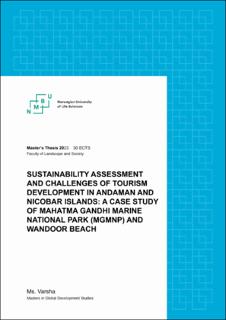| dc.contributor.advisor | ESPEN OLAV SJAASTAD | |
| dc.contributor.author | Varsha, Varsha | |
| dc.date.accessioned | 2023-10-20T16:27:13Z | |
| dc.date.available | 2023-10-20T16:27:13Z | |
| dc.date.issued | 2023 | |
| dc.identifier | no.nmbu:wiseflow:6873791:55153126 | |
| dc.identifier.uri | https://hdl.handle.net/11250/3097853 | |
| dc.description.abstract | Tourism has become a significant source of income for the Andaman and Nicobar Islands, leading to a notable rise in local involvement in tourism-related endeavors. This transition from traditional livelihoods has led to an increased reliance of the local population on tourism as their primary economic activity. However, this shift has also made them more susceptible to the potential vulnerabilities that the tourism sector can introduce.
In this research, we conducted an analysis of the sustainability of tourism in light of the challenges encountered by the sector, using the Mahatma Gandhi Marine National Park and Wandoor Beach as a case study. The findings underscore both the emergence of tourism as a means of livelihood and its associated vulnerabilities for the host communities, highlighted by consecutive incidents of crocodile attacks and the subsequent closure due to the COVID-19 pandemic. | |
| dc.description.abstract | | |
| dc.language | eng | |
| dc.publisher | Norwegian University of Life Sciences | |
| dc.title | SUSTAINABILITY ASSESSMENT AND CHALLENGES OF TOURISM DEVELOPMENT IN ANDAMAN AND NICOBAR ISLANDS: A CASE STUDY OF MAHATMA GANDHI MARINE NATIONAL PARK (MGMNP) AND WANDOOR BEACH | |
| dc.type | Master thesis | |
